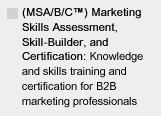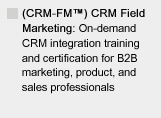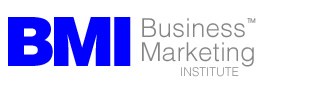MAKE SURE YOU CONTINUE TO RECEIVE EACH ISSUE OF TUESDAY MARKETING NOTES—CLICK HERE TO RENEW YOUR FREE SUBSCRIPTION (IF YOU'VE ALREADY SUBSCRIBED, NO NEED TO RE-SUBSCRIBE)

Are You Ready for the Post-Marketing Era?
In this Recession, Marketing as Usual Isn’t Working.
Here’s a Roadmap to the Changes Needed
for Business Survival (Part 1)
by Eric Gagnon
It’s been five months now since we warned about the Great Marketing Wipeout of 2009. By now, we’ve all been affected by the cutbacks, layoffs, and other consequences of this deep recession.
What is also becoming clear is the current, “old” marketing ways aren’t working anymore, as evidenced by this year’s steep cutbacks in print advertising, trade shows, and other conventional marketing media. Advertising is always the first budget item cut by many companies in a recession, because many companies run ads that don't generate sales response or a measurable return. For these companies, this condition renders most of their marketing budgets financially indefensible. If any advertiser could prove that spending $1.00 on a print ad, for example, generated a return of $1.20, do you think they’d be cutting back?
This explains why so many companies are switching their marketing budgets from traditional brand-building print ad campaigns to online advertising, such as pay-per-click keyword search advertising, where response can be measured.
But there’s much more to what’s happening today in B2B marketing, and it goes well beyond the emergence of new marketing media such as pay-per-click: We are now entering a new era for business marketing, a “post-marketing” era. While the recession has exposed ineffective, unaccountable marketing, it has also accelerated the decline in traditional B2B marketing approaches that’s already been underway, as prospects have changed the way they learn about, research, and buy products and services in B2B markets, using the Internet and Google instead of trade publications, trade shows, and other conventional marketing media to learn about and evaluate new products for their companies.
The Post-Marketing Era: Prospects Demand Content Over Awareness
Prospects in most B2B markets—probably yours, too—can access a wide range of information on and about any product or application they need to purchase or address in their business, without learning about it first from your advertising or other marketing activities.
Prospects no longer need awareness. They need your content, and they can get it very easily, with or without your help. This has fundamentally changed the traditional B2B sales and marketing process:
1.) Company drives content: In the “old” (current) sales and marketing era, marketing used advertising, direct mail, and other marketing media to make prospects “aware” of the company, its product, and its “brand,” and to drive prospects to sales reps, who “educated” customers in a gradual process of engagement, providing information as needed to the prospect during the traditional stages of the purchasing process, and guiding the prospect to the “close;”
2.) Prospect drives content: In the post-marketing era, prospects search online for products to solve their problems when they are well along in their final purchase decision and vendor selection stage. When they contact your company, it’s because they’ve already read your product information and other content online, and this content has motivated them to call. You can't make these prospects “aware” of your product through print advertising, because they don’t read trade publications anymore; nor must they be “educated” by a sales rep; they already know the fundamentals about your product and its general applications. What they need to learn from your sales rep and from your marketing program is how your product helps them solve their particular problem or applications need, and why your company is uniquely suited to help them do this
Too many companies still operate in mode 1.) above, when their prospects now operate in mode 2.). As a result, many prospects now use the Internet exclusively when they’re researching new products, they ignore most conventional B2B advertising as irrelevant marketing hype and, when they’ve acquired some basic product knowledge from their searches, they turn to a company’s sales rep for the specific guidance they need to solve their problem. Here, content that should have been supplied as part of the company’s lead development program (also absent in most B2B marketing programs) to address these issues isn’t there, because most companies don’t know the game has changed.
Not only has the game changed, but the sales slowdown during this recession has accelerated the collapse of conventional B2B marketing. Are you ready to change your approach to succeed in this new world?
“Marketing,” as We Know it, is Over in B2B.
Welcome to the
Post-Marketing Era
This future, now here sooner because of this recession, means the end of “marketing” in B2B as most of us know it, and the beginning of a new post-marketing future. What isn’t working in the current recession is burning down around us, but a few smart companies are now shifting resources into other marketing media, and using conventional marketing media in new ways to generate better response and measurability.
One fact that will never change is that companies still need to sell their products to prospects who need to buy. The people who do the selling, whether they’re part of what we currently know as in-house sales teams, or operating as freelance sales consultants in the outsourced sales organizations of the future, will need the direction, deliverables, communications resources, and support necessary to sell those products. That’s still marketing, but not marketing the way most of us think of it today.
These shifts will also change what it means to be a professional in both sales and marketing. As recently discussed by Dave Stein and Maureen Blandford, author of the book Branding is Dead, in an excellent interview on Dave Stein’s Sales Leadership Blog, sales training, for example, is changing its focus from developing better techniques of psychological manipulation (also known as “closing”), to consultative methods that train sales professionals to become expert business advisors who know how their product solves problems in highly specialized fields.
As well, marketing will change from a “soft” to a “hard” discipline, away from its emphasis on soft, unmeasurable, untrustworthy attributes like branding, product awareness, and marketing hype, and oriented to producing hard, measurable response from well-executed content-based marketing programs using both new online media and radically altered conventional marketing media.
In the Post-Marketing Era, Content is King
The successful B2B marketing professionals in our new, post-marketing era will, above all, be successful developers of content. For lead generation and lead development, this content, in all of its forms—from what we currently know as sales copy, to the wide range of content based on a company’s unique knowledge that can be turned to the mission of selling its products—will be the major element in every means utilized to sell a company’s products in the post-marketing era.
In this post-marketing era, content is the raw material that makes it possible for prospects in your market to use the Internet to objectively research, evaluate, and compare a wide range of product options. The quality, range, and availability of content provided by your company now becomes the most important deciding factor in putting your company’s products in front of prospects interested in buying those products, and the most important deliverable for marketing professionals in the post-marketing era, who must now focus on discovering, developing, and delivering this content in support of their company’s sales efforts.
The Post-Marketing Era in B2B Means Developing Marketing Programs Around Content
The new forms of marketing media, as well as the forms into which current “old” media will evolve, are especially suited to content delivery. For example, keyword searchers—your prospects—looking for products on Google want substantive product facts and insights delivered as content, not clever taglines. While trade publication readers respond less to brand-oriented print advertising, they are very responsive to ads that offer free content, such as problem-solving white papers or reports.
Using content-based marketing programs, the quality of the content you provide to your potential and actual prospects in these new channels, in the form of useful, factual, credible information to help your potential customers solve problems and improve their operations and revenue, ultimately determines the success of your marketing program in this new post-marketing era, and your present and future success as a B2B marketing professional.
Next week, we’ll give an overview of the process of re-engineering your marketing program around content, and other key aspects for developing the content required in the post-marketing era . . .
Eric Gagnon (eric@realmarkets.net), a director with the Business Marketing Institute, is author of The Marketing Manager’s Handbook and The CRM Field Marketing Handbook, and president of GAA ( http://www.realmarkets.net ), an interactive marketing, turnaround, and product development consulting firm.








